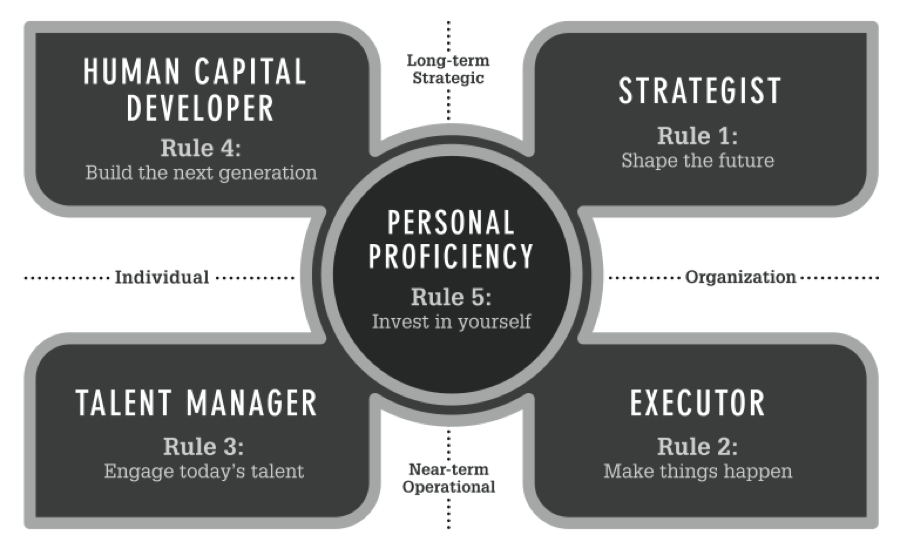In my upcoming book with Kevin Peck on leadership development (Designed to Lead), we reference research and writing from Dave Ulrich. Dave is a professor of business at University of Michigan and partner and cofounder of The RBL Group. Dave has been ranked the #1 Management Educator & Guru by Business Week, selected by Fast Company as one of the 10 most innovative and creative leaders, and named the most influential thinker of the decade in HR by HR magazine. His book The Leadership Code provides a fascinating and helpful framework for leadership.
In The Leadership Code, Dave and his coauthors articulate that as much as 70% of leadership is transferable from one context to another (the other 30% is specific to that context or industry). The 70% is the code and contains five essentials:
- Strategist (focused on the organization for the future)
- Executor (focused on the organization today)
- Talent manager (focused on individuals today)
- Human capital developer (focused on individuals for the future)
- Personal proficiency (the center of the model: person of character and integrity)
I am honored to interview Dave on the blog today and encourage you to check out the book. Here are my questions followed by his responses:
Eric Geiger: You write that “all leaders must excel at personal proficiency.” How does one’s character and integrity impact his or her leadership?
Dave Ulrich: When we distilled the competencies of leaders into five domains (the leadership code), we organized them into the above chart. At the heart of this chart is what we call “personal proficiency,” which includes character and integrity in addition to physical, social, emotional, and intellectual skills. Character and integrity represent a spiritual or moral code. They ensure trust that gives leaders a license to lead and builds follower confidence. Character and integrity are the foundations on which leadership is ultimately built.
EG: It seems there is more emphasis on integrity and character in leadership. What do you think is causing this emphasis?
DU: We read the press or we personally experience leaders who care more about themselves than helping others. Leadership narcissism is never good leadership. Leaders with integrity and character succeed because they help others succeed. Good leaders are not about who they are but how they make others better. When personal integrity or character is missing, leaders cannot instill confidence in others.
EG: In your consulting and research, which leadership dimension is the most commonly neglected (strategist, executor, talent manager, or human capital developer)?
DU: We have done a number of 360 instruments with leaders around the world in large and small companies, privately held and publicly traded, and across industries. While each leader has a unique profile on the five dimensions, the one that is generally lowest is “human capital developer.” Often leaders judge themselves by their success more than the success in others. Being a human capital developer is a bit like a good parent whose success is helping his or her children develop their own talents, not the aspirations of parents. Helicopter parents need to become supportive mentors. Likewise, leaders succeed when those they lead build their capabilities.
EG: When you challenge executives and others to invest in the next generation of leaders, what do you say?
DU: When I grew up, my dad built campgrounds for the government that we often stayed in. Each time we camped in a new or old campground, dad would challenge us to leave the campground cleaner than we found it. Likewise, the ultimate test of a leader is how well s/he can build leadership. One of my simple intuitive tests of the quality of a leader is: Do I feel better or worse about myself when I leave my interaction with the leader? Leaders make others feel better, in both good times and bad. The next generation of leadership has incredible talents and gifts. Leaders have to find ways to empower others to learn their skills.
EG: You call feedback “the breakfast of champions” and mention that great leaders must give and receive feedback. How does feedback increase a leader’s ability to “make things happen”?
DU: In the research on being an effective leader, we often seek to find the Holy Grail, or the most significant personal factor of an effective leader. And in the research, the most common leadership driver is learning agility, resilience, or grit. Behind learning is a commitment to reflect on and learn from experience. Feedback helps executives know what worked. Marshall Goldsmith talks about the importance of feedforward, where you are not evaluated on what you have done but aware of the opportunities of what you can do.







